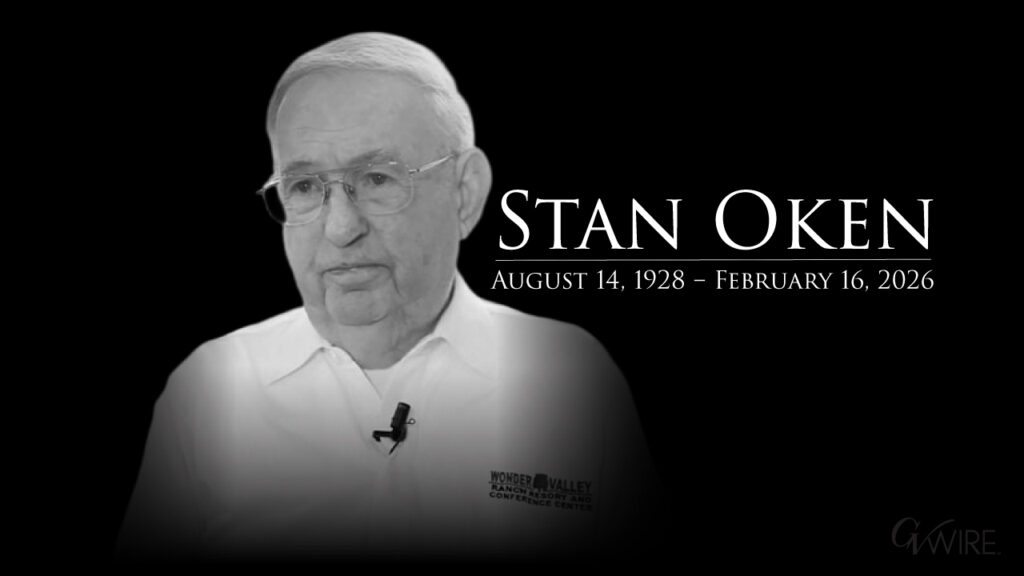Gov. Gavin Newsom signed AB 98 into law Sunday after the California Chamber of Commerce helped negotiate the rules outlining statewide standards for warehouse development. (GV Wire Composite/David Rodriguez)

- The state Chamber of Commerce praises Newsom's approval of AB 98. It sets statewide standards for how logistics businesses should be developed.
- Both environmental justice groups and business advocacy groups opposed the bill, saying it either didn't go far enough or it took away local control.
- Cal Chamber anticipates changes to the bill in coming years.
Share
|
Getting your Trinity Audio player ready...
|
Gov. Gavin Newsom signed Assembly Bill 98 on Sunday, forcing cities and counties to adopt statewide regulations around warehouse development and truck routes.

“This will severely impact our ability to bring in new business or expand local businesses.” — Ed Dunkel, CEO, Precision Civil Engineering
Seeking to address the contentious fight around industrial businesses in California, the bill establishes design standards for logistics businesses, which have become major employers with the rise of online shopping.
The bill had drawn opposition from both business and environmental interests. Business advocates said that land use decisions should be left to municipalities. Environmental groups said it did not go far enough.
Newsom did not issue a statement when signing it.
Ed Dunkel, CEO of Precision Civil Engineering, called the approval of AB 98 “disappointing.”
“This will severely impact our ability to bring in new business or expand local businesses,” Dunkel said. “This will have a cumulative impact in that ancillary businesses such as ours will be hurt by loss of business.”
Related Story: Warehouse Bill Would Be Job Killer in Fresno. Leaders Call for Newsom’s ...
Bill is a Good Compromise: Cal Chamber
The crux of the bill focuses on how warehouses close to “sensitive receptors” should be designed.
The bill defines sensitive receptors as residences, schools, daycare facilities, parks, nursing homes, hospitals, and more. The bill also requires cities and counties to outline truck routes. Builders that have to demolish a home must also build two low-income homes.
Warehouses within 900 feet of a sensitive receptor have to orient their loading docks in specific ways and businesses have to create mitigating factors such as sound barriers.
“Local governments have prioritized economic development over the quality of life and health of their communities,” wrote the bill’s authors, Assemblymembers Juan Carrillo (D-Palmdale) and Eloise Gomez Reyes (D-Colton) in the analysis paper. “AB 98 is the product of months of discussion and collaborations from environmental advocates, leaders in industry, labor, and dedicated public health advocates to raise the standards of warehouse development.”
The California Chamber of Commerce helped negotiate the bill, according to Politico. The chamber supported Newsom’s decision, saying AB 98 provides a sensible path forward to allow businesses to operate and expand.
“AB 98 is a compromise that avoids the negative economic and environmental impacts that would arise from much more stringent and unworkable legislation while still addressing community concerns,” the statement read. “While any bill of this magnitude is expected to have future clean up, the bill will help maintain California’s position as a leader in both economic innovation and environmental stewardship.”
AB 98 Takes Negotiation out of the Equation: INVEST Fresno
Ethan Smith, industrial broker and senior vice president with Newmark Pearson Commercial, said that while statewide standards may be good for certain industries, real estate issues are best handled by local government.
“Historically, real estate has really been driven by the local government and shaped by the priorities of a local community,” Smith said. “This has now really gone past high-level regulation into really dictating site planning things that would really be connected to architecture and engineering.”
Local governments will often have their own rules about warehouse development. As buildings get approved, discussions between architects and city planners lead to decisions on how to construct buildings in an optimal way, Smith said.
AB 98 takes that back-and-forth out of the conversation, Smith said. The state Attorney General’s office can fine jurisdictions $50,000 for every six months that development codes don’t meet AB 98 minimums.
The California Senate in its analysis said the cost to update local rules could cost hundreds of millions of dollars statewide.
The bill also requires builders to build two homes for every one needing to be demolished. Smith said especially in the Central Valley, where farmland is often converted, tearing down farmhouses is commonplace.
Building two new units could add hundreds of thousands of dollars to development costs, Smith said.
Bill Had United Opposition from Both Sides of Industrial Fight
In what could be considered a rarity, AB 98 garnered opposition from both sides of the industrial fight. Opponents included cities and counties throughout the state. Dozens of business advocacy groups and environmental justice groups also came together to oppose the bill.

“We need the Legislature and the governor to commit to working with us next year to get real protections for our communities.” — Andrea Vidaurre, co-founder of the People’s Collective for Environmental Justice
Proponents were largely labor unions, including the California Federation of Labor Unions, AFL-CIO, and the California Teachers Association.
“Unfortunately, the late gut-and-amend will not achieve what we can and must achieve to promote health and well-being in parts of the state that are bearing the impacts of warehouse development,” the Center for Community Action and Environmental Justice said in a statement.
Referred to as a gut-and-amend bill, AB 98 began as an agricultural bill then was changed only days before the end of the legislative session.
Recognizing the competing sides’ unified opposition, Fresno City Councilman Miguel Arias told GV Wire a good compromise is one where neither side is happy.
AB 98 Not the End for Environmental Justice
But environmental groups may still want more when it comes to environmental protection.
“We need the Legislature and the governor to commit to working with us next year to get real protections for our communities,” Andrea Vidaurre, co-founder of the People’s Collective for Environmental Justice, told Politico.
AB 98 is only the latest environmental law to come out regarding industrial development. Smith said the constantly moving target has become a real challenge for business development.
“Those are all the realities of working in a state that is highly regulated and, quite frankly, doesn’t appear to think there is enough regulation,” Smith said. “It’s very much a business risk to be in a state that continues to move the goal posts of regulation further and further away.”
RELATED TOPICS:
Categories

Tech, TV, Movies, and News: Ellisons on Brink of Colossal Empire

The Birth Rate Is Plunging. Why Some Say That’s a Good Thing


















